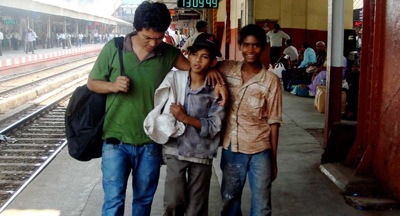Friday, June 15, 2012, 8:00 pm, $6
 Lucky Express: a full length feature documentary that winds through India’s railways and stations, in the company of destitute children who have made Indian Railways their vast network and home. Confiding their life stories, fears, hopes and dreams, these disowned and abandoned youngsters astonishingly entrust their sobering reality to Lucky – former train station vagrant. Through him, we experience a rare and intimate connection, shaping the tone of the film. Criss-crossing the plains of India all the way to Nepal, we wind our way up the foothills of the Himalayas in search of Lucky’s family.
Lucky Express: a full length feature documentary that winds through India’s railways and stations, in the company of destitute children who have made Indian Railways their vast network and home. Confiding their life stories, fears, hopes and dreams, these disowned and abandoned youngsters astonishingly entrust their sobering reality to Lucky – former train station vagrant. Through him, we experience a rare and intimate connection, shaping the tone of the film. Criss-crossing the plains of India all the way to Nepal, we wind our way up the foothills of the Himalayas in search of Lucky’s family.
No one knows the exact number of abandoned and abused runaway children who have been forced to live their lives in the train stations of India. Social workers have counted up to two hundred children arriving at the larger stations every day. According to UNICEF, there are approximately eleven million child runaways in India. More than 70% of these children are less than fourteen years old, and it is not uncommon to see children as young as three year olds among them. They work as soon as they are able to speak.
With over 39,450 miles of tracks, 15,000 trains, 11 million passengers daily, 1.6 million employees and over 7,000 stations, Indian Railways is a universe unto itself—a seething, endlessly energized network through which pass all the diverse cultures of the subcontinent and its billion-plus souls.
Why are they found at the train stations? The stations provide access to public toilets, water and—most importantly—leftover food and opportunities to make money. Children are involved in a variety of different work at the train stations, including begging, vending, rag-picking, performing for travelers, cleaning and sweeping, shoe shining, and selling refilled bottles of water. Bottle collecting is one of the most common enterprises: empty water bottles are abandoned by passengers, gathered by the children, and brought to local recycling houses, where the kids receive no more than a pittance for their efforts. At the very most, children might make 150 rupees (ca US$3) a day from bottle collecting—spent immediately either on food or on such goods as glue for sniffing. Money can never be saved, of course; what isn’t spent is usually stolen by other children, by gang members or pimps. An estimated 90% of the children are engaged in substance abuse.
These children are in constant danger. It has been estimated that it takes an average of twenty minutes after arrival at a station before a child is approached by an older sexual predator, or is offered drugs in exchange for sex. Some children have to prostitute themselves to gang members in order to ensure themselves a somewhat safe place to sleep at the station. Life is hard, a daily struggle to survive. As the children get older, their only chance of survival is to to join the gangs. Life at the train stations is as tough as it gets for a kid in India.
info: http://www.luckyexpress.org
